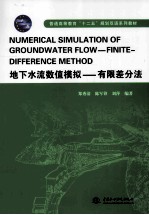图书介绍
地下水流数值模拟 有限差分法pdf电子书版本下载

- 郑秀清,陈军锋,刘萍编著 著
- 出版社: 北京:中国水利水电出版社
- ISBN:9787517017844
- 出版时间:2014
- 标注页数:119页
- 文件大小:22MB
- 文件页数:130页
- 主题词:地下水-数值模拟-有限差分法-高等学校-双语教学-教材-汉、英
PDF下载
下载说明
地下水流数值模拟 有限差分法PDF格式电子书版下载
下载的文件为RAR压缩包。需要使用解压软件进行解压得到PDF格式图书。建议使用BT下载工具Free Download Manager进行下载,简称FDM(免费,没有广告,支持多平台)。本站资源全部打包为BT种子。所以需要使用专业的BT下载软件进行下载。如 BitComet qBittorrent uTorrent等BT下载工具。迅雷目前由于本站不是热门资源。不推荐使用!后期资源热门了。安装了迅雷也可以迅雷进行下载!
(文件页数 要大于 标注页数,上中下等多册电子书除外)
注意:本站所有压缩包均有解压码: 点击下载压缩包解压工具
图书目录
Chapter 1 Introduction 1
1.1 Brief of Groundwater 1
1.1.1 Importance of Groundwater 1
1.1.2 Groundwater Resources Management 2
1.2 Process of Groundwater Modeling 3
Chapter 2 Mathematical Model of Groundwater Flow 9
2.1 Basic Concepts 9
2.2 Basic Law 12
2.2.1 Law of Energy Conservation 12
2.2.2 Law of Mass Conservation 17
2.3 Basic Equation of Groundwater Flow 18
2.3.1 Basic Equation for Steady Incompressible Flow 18
2.3.2 Basic Equation for Non-steady Compressible Flow 19
2.4 Boundary Conditions 21
2.4.1 Boundary Conditions 21
2.4.2 Initial Conditions 22
2.5 Mathematical Model 23
Chapter 3 Numerical Method—Finite-Difference Method 24
3.1 Main Ideas and Solving Steps 24
3.1.1 Main Ideas of Finite-Difference Method 24
3.1.2 Steps of Solving Groundwater Flow Problem by Difference Method 24
3.2 Finite Difference Formulae 25
3.2.1 Finite Difference Approximation 25
3.2.2 Convergence and Stability 27
3.3 Steady Flow in Confined Aquifers 27
3.3.1 1-D Steady Flow 27
3.3.2 2-D Steady Flow 34
3.4 Transient Flow in Confined Aquifers 37
3.4.1 1-D Transient Flow 37
3.4.2 2-D Transient Flow 40
3.5 Transient Flow in Unconfined Aquifers 44
Chapter 4 Introduction and Tutorial of Visual MODFLOW 48
4.1 Introduction of Visual MODFLOW 48
4.1.1 Brief Introduction of Visual MODFLOW 48
4.1.2 About the Interface 48
4.1.3 Main Menu Screen 49
4.1.4 Screen Layout 49
4.2 Instructions of Example Model 50
4.3 Creating and Defining a Flow Model 52
4.3.1 Generating a New Model 52
4.3.2 Refining the Model Grid 55
4.3.3 Adding Wells 62
4.3.4 Assigning Model Properties 63
4.3.5 Assigning Model Boundary Condition 68
4.3.6 Assigning Particles 73
4.4 Running Visual MODFLOW 74
4.4.1 Run Options for Flow Simulations 74
4.4.2 Engines to Run 75
4.5 Output Visualization 76
4.5.1 Head and Contouring Options 76
4.5.2 Velocity Vectors and Contouring Options 78
4.5.3 Pathlines and Pathline Options 80
Chapter 5 Numerical Simulation of Impervious Wall Construction of Xizhang Basin Groundwater Reservoir in Taiyuan 83
5.1 Model Objectives 83
5.2 Overviews of the Xizhang Basin 83
5.2.1 Regional Geography 83
5.2.2 Regional Geological and Hydrogeological Conditions 85
5.2.3 Social and Economic Situation 86
5.3 Conditions for the Construction of Underground Reservoir 86
5.4 Groundwater Flow Model for Xizhang Basin 87
5.4.1 Hydrogeological Conceptual Model 87
5.4.2 Establishment Groundwater Model 88
5.4.3 Identification and Calibration of the Model 92
5.5 Influences of Impervious Wall on Groundwater Flow 98
5.5.1 Input Data for Wall Boundary 98
5.5.2 Simulation Impervious Wall by Wall Boundary 98
5.5.3 Correction of Impervious Wall Parameters 98
5.5.4 Effects of Impervious Wall Construction on the Simulation of Groundwater Flow 99
Chapter 6 Application of MODPATH to Classify Protection Area in Tumen 106
6.1 Model Objectives 106
6.2 Overviews of Water Source Situation in Tumen 106
6.2.1 Geography 106
6.2.2 Regional Geological and Hydrogeological Conditions 108
6.3 Groundwater Flow Model for Tumen Water Source Area 109
6.3.1 Hydrogeological Conceptual Model 109
6.3.2 Mathematical Model for the Groundwater Flow 109
6.3.3 Model Validation 111
6.4 Delineation of Water Source Protection Zones by MODPATH 113
6.4.1 Numerical Simulation Method 113
6.4.2 Procedure of Protection Zones Delineation 114
6.4.3 Results of Protection Zones Delineation 114
References 119